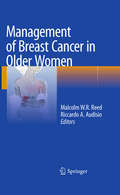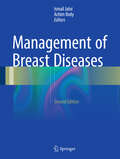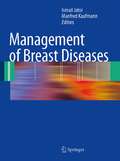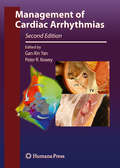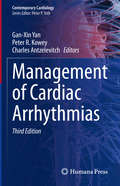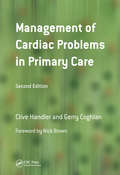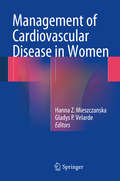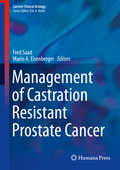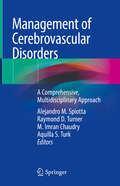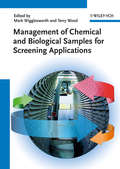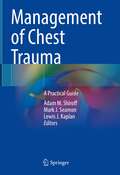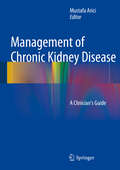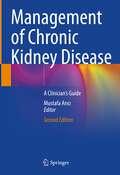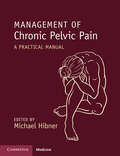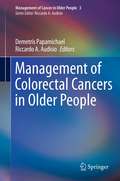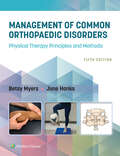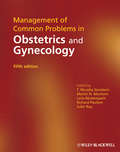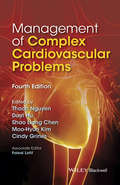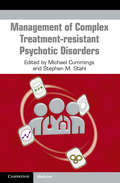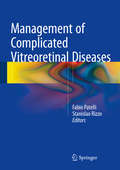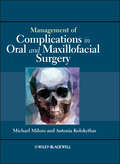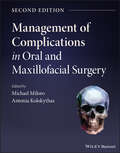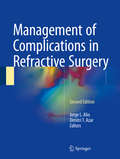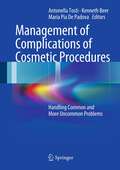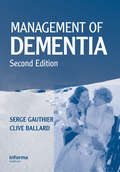- Table View
- List View
Management of Breast Cancer in Older Women
by Riccardo A. Audisio Malcolm W. ReedThere has been a recent surge of interest in the general topic of how older patients should be treated with various forms of malignancy, with particular focus on the management of breast cancer. This group of patients has been neglected in the past, with a failure to recruit them to clinical trials resulting in a lack of evidence on which to base treatment guidelines. The co-editors on this title are directly involved in a number of initiatives to address this gap in knowledge, and are thus perfectly placed to invite other expert individuals to author specific chapters in the proposed text.
Management of Breast Diseases
by Ismail Jatoi Achim RodyThis text is intended as a practical guide for physicians and surgeons who treat diseases of the breast, both benign and malignant. Thus, general surgeons, internists, family practitioners, gynecologists, surgical oncologists, radiation oncologists, and medical oncologists will find this book useful. The management of breast diseases requires a multidisciplinary approach, and this textbook therefore includes the views of a wide range of specialists from throughout the world. Today the treatment of breast diseases is largely predicated on the results of randomized prospective trials. The results of many clinical trials are discussed in detail, and readers will find this book to be a useful guide to the evidence-based treatment of breast diseases. The revised edition provides a comprehensive update of the previous version of the book. Specifically, it contains 2 new chapters: "Molecular Classification of Breast Cancer" and "Breast Cancer Molecular Testing for Prognosis and Prediction". In addition, since publication of the previous edition, the results of numerous adjuvant systemic therapy and neo-adjuvant systemic therapy trials have been published, and this edition provides a comprehensive overview of these trials and discusses how they have changed the management of breast cancer. Similarly, there have been, in the last few years, important new developments in the local therapy of breast cancer. This edition discusses these new developments and particularly recent developments and controversies concerning the management of the axilla in patients with primary breast cancer. New guidelines with respect to radiotherapy are also reviewed and discussed. Finally, all chapters in the book are thoroughly revised and updated to provide readers with current understanding of the biology and treatment of breast cancer.
Management of Breast Diseases
by Ismail Jatoi Manfred KaufmannThis multi-authored and comprehensive work provides a reference to the overall management of diseases of the breast (both benign and malignant). Pertinent controversies are discussed, and perspectives presented from both sides of the Atlantic. This highly practical guide serves as a reference for the wide range of physicians and surgeons who treat diseases of the breast.
Management of Cardiac Arrhythmias
by Peter R. Kowey Gan-Xin YanFew areas of medicine have evolved as rapidly as cardiac electrophysiology. What were only a short time ago seen to be lethal rhythm disturbances can now be treated with confidence in a diverse spectrum of patients. The first edition of Management of Cardiac Arrhythmias, published over ten years ago, has served clinicians not only as a practical guide to cardiac arrhythmias, but also as a comprehensive reference source. The second edition builds upon the concise style and expert authorship of its predecessor to provide the most up-to-date information on the diagnosis and treatment of this group of diseases. The introductory chapters begin with historical perspectives of the field and move on to discuss the scientific basis of arrhythmogenesis and diagnostic testing. The book then devotes specific chapters to various arrhythmias, including technical innovations in treatment and insights from clinical trials of and current guidelines for permanent pacemakers and implantable cardioverter-defibrillators. Subsequent chapters focus on arrhythmias in specific populations, including athletes, children, and women during pregnancy. Syndromes such as syncope, long and short QT syndrome, and J wave syndromes are also covered. Presenting complex information in a clearly structured and efficient format, this book is an incomparable asset to cardiologists and other physicians and health care professionals involved in the treatment of patients with cardiac arrhythmias.
Management of Cardiac Arrhythmias (Contemporary Cardiology)
by Charles Antzelevitch Peter R. Kowey Gan-Xin YanA significantly expanded third edition, this book provides a comprehensive and concise overview of cardiac arrhythmias and their ECG/telemetry manifestations, including the principles of cardiac electrophysiology, current concepts of pharmacology, clinical features, diagnoses, and state-of-the-art treatments. Additionally, the book emphasizes decision-making strategies in approaching each individual patient and the application of technical innovations in specific clinical situations. Organized into eight parts, beginning chapters introduce the concepts and principles of cardiac electrophysiology, unique rhythms, and ECG waves/signs. These chapters are designed to integrate emerging knowledge in basic science and clinical medicine. Subsequent chapters focus on the diagnosis of a variety of cardiac arrhythmias using non-invasive methodology. Throughout the book, chapters continue to analyze pharmacological and other approaches to therapy of specific arrhythmias, including supraventricular tachycardias, atrial fibrillation and flutter, ventricular arrhythmias, and bradyarrhythmias. Finally, the book closes with coverage on inherited cardiac arrhythmia syndromes including the long, short QT, and J-wave syndromes, catecholaminergic polymorphic ventricular tachycardia, and arrhythmogenic right ventricular cardiomyopathy. The third edition of Management of Cardiac Arrhythmias, is an essential resource for physicians, residents, fellows, and medical students in cardiology, cardiac surgery, vascular surgery, cardiac electrophysiology, and cardiac radiology.
Management of Cardiac Problems in Primary Care
by Gerry Coghlan Clive HandlerClive Handler and Gerry Coghlan have written a book that will become essential reading for the primary care physician managing cardiac problems in the new age of medical practice. In it they give clear, concise and readable information on diagnosis, management and treatment priorities in this most important field of medicine. The book uses current evidence and follows current guidelines to direct the clinician in treating conditions seen every day in general practice. It builds confidence in understanding the role and responsibility in commissioning cardiology specialist care.The narrative is peppered with real patient problems and sections giving advice to patients in layman's language. This book will not only promote the primary care physician's ability to manage problems in-house but also guide the commissioning clinician on putting in place appropriate and efficient specialist services. An excellent text that will be a valuable addition to the libraries of all general practices. Buy more than one copy - clinicians from practice nurses, students and registrars to the most senior doctors will all find it essential reading.
Management of Cardiovascular Disease in Women
by Hanna Z. Mieszczanska Gladys P. VelardeCardiovascular disease is the leading cause of death in women in the US, with more women dying from heart disease than men. Women may have different presentation from men and often need a different approach to diagnosis and treatment. There are also unique topics of management of heart disease in women, including issues during pregnancy, lactation, and menopause. Many different health care providers, as well as cardiologists are involved in treating these patients. A manual reviewing diagnosis and treatment of cardiac disease in women would help providers without specific cardiology training to deliver care with greater efficiency. A practical and comprehensive guide geared towards these providers would be a highly practical and valuable resource that would be utilized in everyday practice in offices that include urban clinics, general medicine offices, obstetrics and gynecology offices, as well as in the surgical subspecialties. This book will be a highly practical resource that can be directly applied to the issues that arise in everyday practice. There is no available book on the market that focuses on a broader approach to cardiac disease in women or focuses on non-cardiology providers (and their trainees) who have the need to know more about treatment of cardiovascular disease in women.
Management of Castration Resistant Prostate Cancer
by Fred Saad Mario A. EisenbergerThis volume provides new data about the molecular biology of CRPC and a review of the definition, staging and prognostic factors that define CRPC. The book features an in depth review of proven therapeutic options, including bone targeted therapies, immunotherapy, chemotherapy and hormonal based therapies. Combination therapy as well as novel targeted approaches presently under investigations are also reviewed. The text provides up to date guidelines and algorithms for the management of CRPC based on international guidelines presently available as well as evidence based medicine. As a concise yet comprehensive summary of the current status of the field, Management of Castration Resistant Prostate Cancer serves as a very useful resource for physicians and researchers dealing with this challenging malignancy.
Management of Cerebrovascular Disorders: A Comprehensive, Multidisciplinary Approach
by Alejandro M. Spiotta Raymond D. Turner M. Imran Chaudry Aquilla S. TurkThis important title brings together a distinguished panel of thought-leaders, known for their insights into the development and application of minimally-invasive surgical and endovascular techniques, to provide a comprehensive and discerning compendium of our most current knowledge and state-of-the-art procedures in the management of cerebral vascular diseases. Written in a style that is accessible to students and experienced practitioners alike, the book covers all the important recent advances that have reshaped the field in dramatic ways. Emphasizing how surgical and endovascular techniques are complementary, the volume includes illuminating chapters on the nexus of endovascular and conventional “open” cerebrovascular surgery, including patient assessment and practice in a hybrid operating environment, utilizing the best methods to achieve optimal outcomes. A major addition to the clinical literature, Management of Cerebrovascular Disorders: A Comprehensive, Multidisciplinary Approach will be of significant interest to neurosurgeons, neurologists, neuroradiologists, neurointensivists, students, residents, fellows, and specialized attending physicians.
Management of Chemical and Biological Samples for Screening Applications
by Mark Wigglesworth Terry WoodFilling an obvious gap in the scientific literature, this practice-oriented reference is the first to tie together the working knowledge of largescreening centers in the pharmaceutical and biotechnological field. It spans the entire fi eld of this emerging discipline, from compoundacquisition to collection optimization for specific purposes, to technology and quality control. In so doing, it applies two decades of expertise gathered by several large pharmaceutical companies to current and future challenges in high-throughput screening. With its treatment of libraries of small molecules as well as biobanks containing biomolecules, microorganisms and tissue samples, this reference is universally applicable for any molecular scientist involved in a large screening program.
Management of Chest Trauma: A Practical Guide
by Lewis J. Kaplan Adam M. Shiroff Mark J. Seamon75% of patients who die from trauma have injuries to the chest. The care of the chest trauma patient can be incredibly complex, require multiple specialty and sub-specialty services, and may require interventions available only at quaternary referral centers.This book provides a comprehensive, state-of-the-art overview of chest trauma. The text reviews all aspects of chest wall, intra-thoracic organ, and great vessel injury management, with each section of the book structured anatomically to explore specific treatment options.The first section of the book contains an overview and introduction to the topic, discussing the definition and significance of chest trauma, initial resuscitation of the chest trauma patient, and centers of excellence, health systems, and regionalization. The following section is focused on chest wall injury, with chapters on acute rib fractures, sternal fracture, clavicle and scapula fractures, non-surgical aids in fracture healing, and anesthesia considerations. The next section spotlights thoracic organ injury, specifically focusing on cardiac injury, aorta and great vessel injury, esophageal injury, tracheal and pulmonary injury, and thoraco-abdominal and combined injuries.Since injury care alone is insufficient in guiding the totality of care, the fourth section is dedicated to inpatient critical care. Topics covered in this section include principles of ICU resuscitation, coagulopathy management, ICU monitoring, ventilator management, and advanced acute pain management. With the increase in violent extremism around the world, including the use of non-conventional weapons, as well as the plethora of natural and man-made disasters, disaster and mass casualty events is the timely subject of the book's final section. Specific topics tackled in this section include blast injury, blast lung, pulmonary aspiration, thoracic crush injury after natural and man-made disasters, toxic agent exposures, the role of the local facility during a national disaster, and the ethics of resource of allocation. The text also features over 100 high-yield illustrations, photographs, and tables.
Management of Chronic Kidney Disease
by Mustafa AriciThis book presents a comprehensive and instructive management plan for physicians who care for CKD patients. Basic aspects of CKD, clinical assessment, evaluation and management of risk factors, cardiovascular disease in the context of CKD, assessment and management of CKD complications, special circumstances in CKD patients, and the path to renal replacement therapy are all thoroughly covered. Diagnostic and therapeutic approaches are presented according to the latest staging system for CKD, with patient care being discussed separately for each disease stage. The proposed management plan is both "best available evidence based" and "practice based". The book also recognizes the needs of busy clinicians by including helpful boxes summarizing the evidence on diagnostic and therapeutic issues and practice pearls based on guidelines. The authors are recognized experts from across the world, ensuring global coverage of the problem, and most have participated in writing guidelines on CKD.
Management of Chronic Kidney Disease: A Clinician’s Guide
by Mustafa ArıcıThe second edition of this essential work presents how to diagnose, treat and develop an appropriate management plan for patients with chronic kidney disease (CKD). Significantly updated chapters cover the fundamental sciences associated with CKD, its clinical assessment, evaluation, management of risk factors, along with cardiovascular disease in the context of CKD. Detailed insight is provided on how to assess for and manage a variety of CKD complications and special circumstances in CKD patients. The path to renal replacement therapy is also thoroughly described. New topics featured include associated rheumatic and electrolyte disorders. Furthermore, diagnostic and therapeutic approaches are presented according to the latest staging system for CKD, with patient care being discussed separately for each disease stage. The book also recognizes the needs of busy clinicians by including helpful boxes summarizing the evidence on diagnostic and therapeutic issues and practice pearls based upon the latest guidelines.Management of Chronic Kidney Disease: A Clinician’s Guide is a comprehensive practically applicable guide to the management of patients with CKD. Its didactic features enable the reader to quickly identify the key points covered and disseminate the information they require, making it a valuable resource for all practicing and trainee medical practitioners who encounter these patients..
Management of Chronic Pelvic Pain: A Practical Manual
by Michael HibnerChronic pelvic pain is a common debilitating condition that impairs quality of life and reproductive function in the female population worldwide. It is also an area in which the level of knowledge is generally poor among gynecologists. This book will help gynecologists and pain management specialists optimize assessment and treatment of women with chronic pelvic pain. It addresses the most common conditions causing chronic pelvic pain in women and offers practical guidelines for treatment. Exploring issues such as pudendal neuralgia and pain caused by pelvic nerve injuries and pelvic mesh. Other sections are dedicated to examining the psychological impact of pelvic pain and the impact of pain on sexuality and relationships. Algorithms on how to work-up and treat patients with chronic pelvic pain are a valuable addition, as well as advice on what to do in situations where known treatments have failed.
Management of Colorectal Cancers in Older People
by Riccardo A Audisio Demetris PapamichaelThis book aims to provide an up-to-date review of the literature in each of the major areas relating to the management of older colorectal cancers patients, and makes recommendations for best practice and future research. The authors come from a broad geographic spread including the UK, mainland Europe and North America to ensure a worldwide relevance.
Management of Common Orthopaedic Disorders: Physical Therapy Principles and Methods
by Betsy Myers June HanksCombining the latest research with a proven, “how-to” approach, Management of Common Orthopaedic Disorders: Physical Therapy Principles and Methods, 5th Edition, offers a practical overview of commonly seen pathology and accompanying treatment options for orthopaedic patients. This fundamental textbook of orthopaedic physical therapy demonstrates therapeutic techniques in vibrant detail and emphasizes practical application to strengthen clinical readiness. Thoroughly updated and now presented in full color, the 5th Edition reflects the latest practice standards in a streamlined organization for greater ease of use
Management of Common Problems in Obstetrics and Gynecology
by T. Murphy Goodwin Laila Muderspach Martin N. Montoro Richard Paulson Subir RoyThis practical book provides current and effective evaluation and treatment options currently available for the full spectrum of conditions affecting women. In easy to consume, bite-sized chapters, it ranges from diseases occurring during pregnancy and the perinatal period, through general gynecologic conditions from childhood to old age, gynecologic urology, oncology, reproductive medicine and family planning.
Management of Complex Cardiovascular Problems
by Shao Liang Chen Thach Nguyen Dayi Hu Moo-Hyun Kim Cindy L. Grines Faisal LatifPatients with complex cardiovascular problems pose a special management challenge for both the specialist and the non-specialist. This book helps you approach difficult cases with the confidence to strategically map care, understand the risk profile of your patient, and make effective treatment decisions. Dependable and succinct content provides high yield information for the busy cardiologist Take home call outs, and critical thinking boxes provide candid advice on incorporating guidelines and evidence based medicine into your practice New convenient pocket-sized format New chapter addressing cardiovascular problems in women Discussion of high risk factors for and strategic care mapping encourage clinical focus Clinical pearls offer expert advice on topical issues Includes emerging trends and clinical trials keeping you up to date
Management of Complex Treatment-resistant Psychotic Disorders
by Cummings, Michael A. Dr. Stahl, Stephen M. Dr.This full-color, practical handbook provides a concise, evidence-based psychopharmacological approach to the management of complex treatment-resistant psychotic disorders. Part I focuses uniquely on topics and strategies relevant to treating this challenging patient population. These approaches go beyond standard guidelines while adhering to research and clinically derived data. Part II provides a concise array of information regarding those classes of medications most commonly used when treating complex treatment-resistant psychotic disorders. Each medication guide contains sections including mechanisms of action, typical treatment response, monitoring, dosing and kinetics, medications to avoid in combination/warnings, and take-home pearls. Part III offers tips in brief appendix chapters for managing common issues ranging from loading lithium and valproic acid to the treatment of acute psychomotor agitation. An essential resource for psychiatrists, forensic clinicians, psychiatric trainees, and all mental health professionals involved with, or interested in, the treatment of challenging psychotic disorders.
Management of Complicated Vitreoretinal Diseases
by Fabio Patelli Stanislao RizzoThis book provides the vitreoretinal surgeon with advice and guidance on how to treat and manage the unpredictable complexities and potential intra- and postoperative complications that are encountered during the course of vitreoretinal surgery. Internationally renowned surgeons share their extensive surgical experience in a clearly written and well-illustrated format, delivering helpful practical answers to the important problems frequently confronted in this ever-challenging area of ophthalmic surgery. Management of Complicated Vitreoretinal Diseases will appeal to surgeons young and old, and will find its home not only in the library but also in the office and the operating room itself. The open and positive way in which the many scenarios and difficulties encountered in surgery are confronted will improve the expertise of the surgeon and, most importantly, the outcomes for patients.
Management of Complications in Oral and Maxillofacial Surgery
by Michael Miloro Antonia KolokythasManagement of Complications in Oral and Maxillofacial Surgery is a comprehensive reference that covers the minor and major complications which may occur in all facets of oral maxillofacial surgery. Each chapter covers the potential complications encountered during the routine practice of oral and maxillofacial surgery, from the most commonly encountered complications, to those less frequent and more complex with which every competent oral and maxillofacial surgeon should be familiar.Drs. Miloro and Kolokythas address possible complications in every aspect of OMS, including anesthesia, third molar surgery, implant surgery, maxillofacial trauma, orthognathic surgery, temporomandibular joint surgery, cleft lip and palate surgery, head and neck oncologic surgery, soft and hard tissue reconstruction, free tissue transfer, and cosmetic facial surgery. The contributors to this textbook, recognized experts in their specific topic due to their surgical experience and expertise, focus on the prompt recognition of each complication, and consider preventative measures as well as precise management strategies considering the already compromised clinical circumstances.
Management of Complications in Oral and Maxillofacial Surgery
by Michael Miloro Antonia KolokythasManagement of Complications in Oral and Maxillofacial Surgery, 2nd Edition, presents clear and consistent guidance on all aspects of both common and less common, minor and major complications encountered in oral and maxillofacial surgery (OMS) practice. In-depth chapters provide thorough descriptions of each complication and recommend treatment strategies for associated complications of anesthesia, implant surgery, maxillofacial trauma, and more, using easy to read algorithms. Fully revised and expanded, the Second Edition incorporates the most current evidence and advances in the specialty, including implementation of virtual surgical planning for orthognathic and reconstructive surgery. Nine entirely new chapters address complications in minimally invasive cosmetic surgery, lip cancer, dermatopathology and skin cancer, microneurosurgery for trigeminal nerve injuries, transoral robotic surgery (TORS), sialoendoscopy complications, perioperative navigation for dental implants, head and neck radiotherapy, and ambulatory anesthesia in pediatric and geriatric patients. Highlights include: Provides a systematic, easy-to-read approach to complication prevention, recognition, and management Covers most potential complications, ranging from the routine to the complex Features more than 500 high-quality clinical images demonstrating all concepts discussed in the text Includes keywords, tables, learning objectives, and further readings in each chapter Includes treatment algorithms to guide clinical decision-making Edited by prominent oral and maxillofacial surgeons with contributions by leading experts in their respective areas Management of Complications in Oral and Maxillofacial Surgery, Second Edition is a must-have for all oral and maxillofacial surgeons, residents, and trainees, and a valuable resource for dental students and dental practitioners, for clinical practice, and for examination preparation.
Management of Complications in Refractive Surgery
by Dimitri T. Azar Jorge L. AlioThis illustrated guide is written by international opinion leaders with extensive experience in the practice of refractive surgery. It is the first book devoted to refractive complications (with practical hints and case reports on outcomes) to provide ophthalmic surgeons with the most adequate solutions for the most frequent problems. All complications are described and lavishly illustrated. The book provides ophthalmic surgeons with the most adequate solutions for the most frequent problems they face in their daily practice.
Management of Complications of Cosmetic Procedures
by Antonella Tosti Kenneth Beer Maria Pia De PadovaThe demand for cosmetic procedures is increasing worldwide. This book presents all the potential side-effects and complications of the most frequently used procedures in aesthetic dermatology and provides sound practical advice on their management. It will be helpful not only to beginners but also to experienced dermatologists who want to start performing new procedures. The text is fully illustrated and very simple to consult. For each procedure, the book discusses both common and uncommon side-effects and complications, provides tips on how to avoid them, and explains clearly how they are best treated.
Management of Dementia
by Serge Gauthier Clive BallardThe second edition of Management of Dementia combines a balanced review of the latest knowledge and research in this area with practical guidance based on the authors' considerable personal experience of dementia care. It is directed at professionals working in the area who want to practice evidence-based medicine without losing sight of the p
